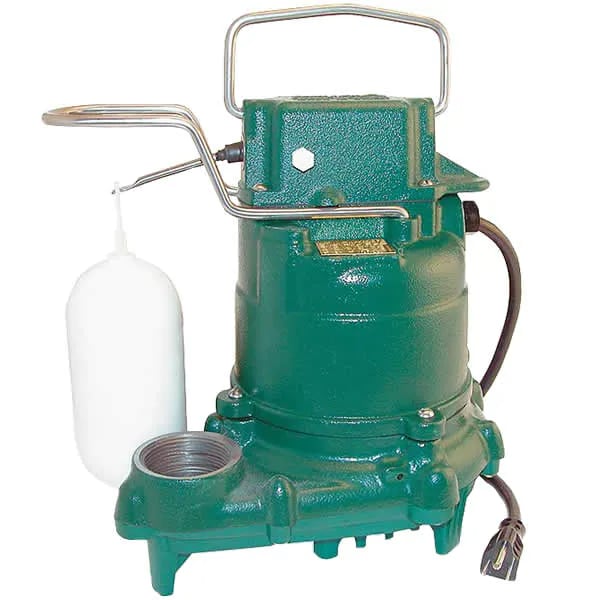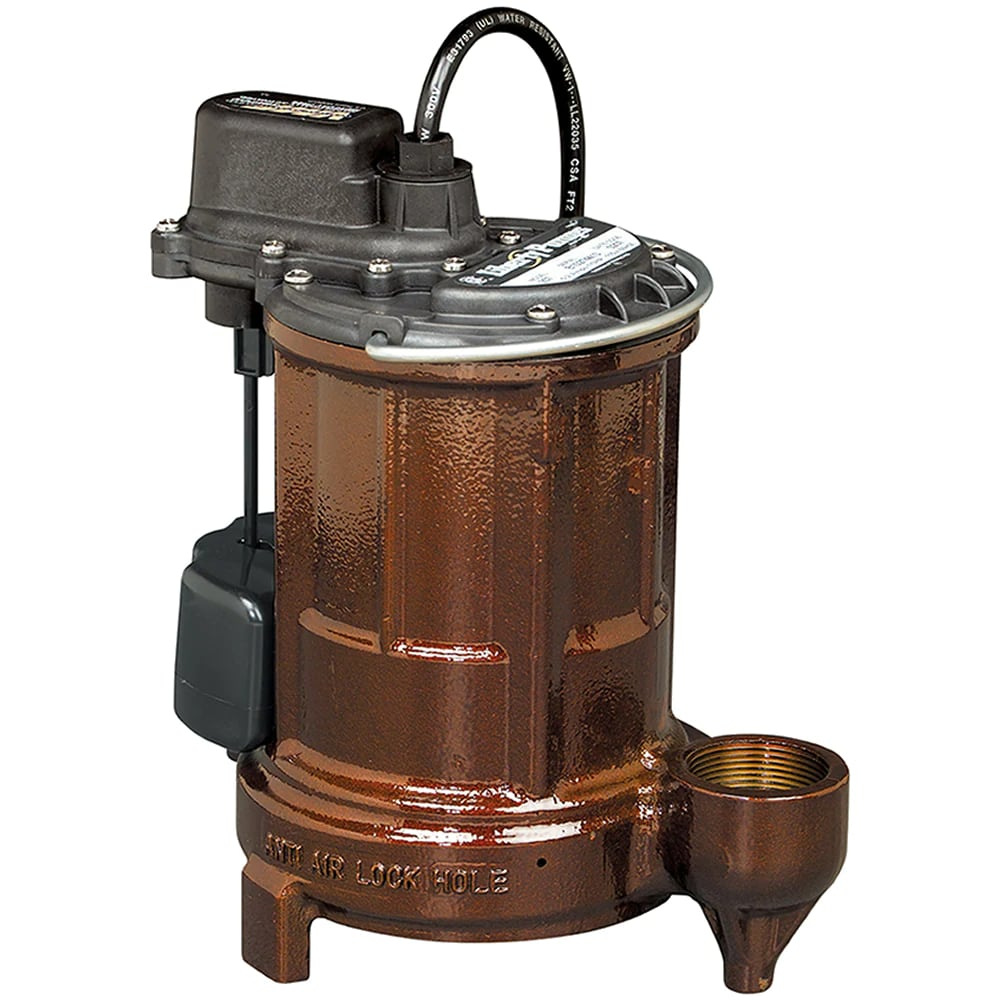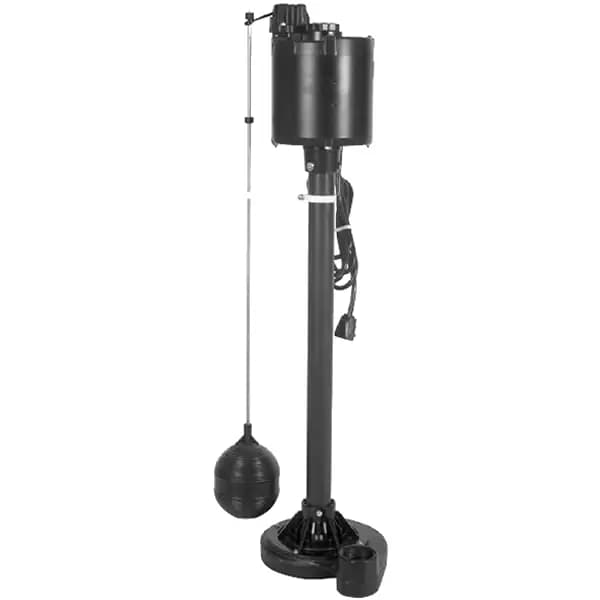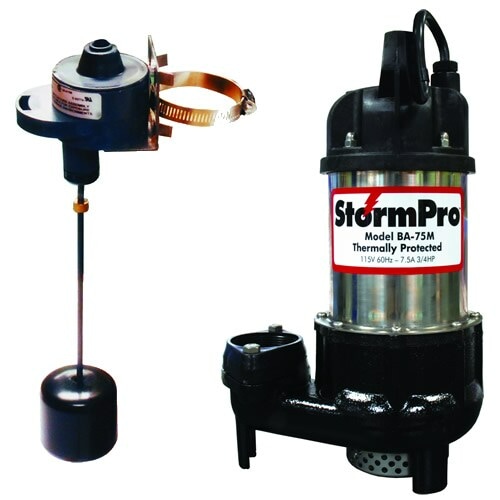![The Top 4 Best Primary Sump Pumps of 2025 [Expert-Picked]](https://www.sumppumpsdirect.com/article-image/375/social_img_1104_a27bafc2cb644bdeeed8ca7d244e428a.png)
The Top 4 Best Primary Sump Pumps of 2025 [Expert-Picked]
Top-Rated & Best-Selling Primary Submersible Sump Pumps
You don’t get a sump pump for how pretty it looks. It has one job: to keep water out of your basement. Still, it can be tricky to find the best one. That’s why I’m here. After decades in the pump industry, I’m sharing my picks for this year's best primary sump pumps.
Spend some time reading through each of the picks. Remember to click on the pumps to view the product page, which contains more features, specs, reviews, and other great resources. Also, check out my selection criteria for picking the best primary sump pumps.
The Best Primary Sump Pumps
| Best Primary Sump Pump | Best Submersible Sump Pump | Best Pedestal Sump Pump | Best Heavy-Duty Sump Pump |
|---|---|---|---|
|
|
|
|
|
Best Primary Sump Pump: Zoeller M53

Built in the U.S.A. and known worldwide as the “Mighty Mate,” the submersible Zoeller M53 is consistently the best sump pump for most households. Its 1/3-horsepower, 120-volt motor can lift water 5 feet at 2,680 gallons per hour (GPH) and provides a maximum vertical lift of 19.25 feet.
Made of cast iron, the motor, pump house, and switch case are designed for rapid heat dissipation and extended life. The pump base, composed of engineered thermoplastic, offers years of reliable operation. The oil-filled motor has thermal protection to prevent overheating, and a carbon and ceramic shaft seal keeps water out to extend the pump’s life. Besides this, the Zoeller M53 is designed to be clog-resistant, capable of passing 1/2” diameter solids and eliminating the need for a protective screen.
Overall, this pump has been the go-to for decades thanks to its power, reliability, and performance, which is why I’m calling it the best primary sump pump of 2025.
| Spec | Details | Rating |
|---|---|---|
| Construction | Cast iron switch case, motor & pump housing; Engineered thermoplastic base; Carbon & ceramic shaft seal; Clog-resistant design | |
| Float Switch Design | Vertical; Mechanically operated; Solid and buoyant polypropylene material | |
| Reliability | Thermally-protected motor; Can pass ½-inch spherical solids; Made in the U.S.A. | |
| Overall Value | A time-tested pump at a great price. Can't beat the value. |
What It's For:
- Most residential applications
- Households with low or average water tables
What It's Not For:
- Households with high water tables
- Households in low, flood-prone areas
Best Submersible Sump Pump: Liberty 257
Built in the U.S.A., the Liberty 257 is the best submersible sump pump thanks to its efficiency and reliability. It uses half the running and starting amps of most other 1/3-horsepower pumps yet has a pumping capacity of 2,700 GPH at a 5-foot lift. The magnetically operated float switch won't get stuck or jammed, and you can count on it to operate in sump pits as small as 10 inches.
Made of cast iron for superior durability, the Liberty 257 also includes non-corrosive stainless-steel fasteners to maximize the pump’s lifespan. What particularly stands out to me is Liberty’s UNI-BODY casting, or solid, one-piece housing that eliminates the need for a lower motor seal, which would otherwise be a potential leak point. Speaking of leak points, the motor is hermetically sealed to keep water out and boost longevity. The vortex-style impeller handles debris really well, and the high capacity 1-1/2” discharge line allows the Liberty 257 to replace most pumps without any plumbing changes.
Unlike many other pumps out there, this one features a 16-gauge quick-disconnect 10-foot power cord for easy replacement if necessary and ball bearings that allow for a smoother and cooler operating environment, which translates to a longer motor life. Everything about this pump screams reliability, making it a solid investment in home flood prevention.
| Specs | Details | Rating |
|---|---|---|
| Construction | Cast iron pump; UNI-BODY one-piece casting with epoxy coated powder coat finish; 416 stainless steel rotor shaft | |
| Float Switch Design | Magnetically Operated Vertical Float Switch; Operates in sump pits as small as 10" | |
| Reliability | Thermally-protected motor; Vortex style impeller easily handles 1/2-inch solids; Contains non-corrosive stainless steel fasteners; Made in the U.S.A. | |
| Overall Value | Extremly reliable pump at a very economical price. |
What It's For:
- Most residential applications
- Households with low or average water tables
What It's Not For:
- Households with high water tables
- Households in low, flood-prone areas
Best Pedestal Sump Pump: Zoeller M84
Pedestal sump pumps are best for small, narrow sump basins, and the best one for the job is definitely the Zoeller M84. Note, this is the only pump on our list that is not submersible. It has a 1/2-horsepower, 120-volt motor that can lift water 5 feet at a rate of 3,540 GPH and 15 feet at a rate of 2,280 GPH. The motor is air-cooled, has thermal overload protection, and is energy efficient, using only 7.3 amps of power. The verticle float switch has 12 inches of adjustability depending on your needs.
You can also count on its durability. The cast iron pump housing and base construction minimizes corrosion caused by hard water and a non-clogging vortex impeller keeps debris out and eliminates the need for pesky filter screens. Additionally, a permanently lubricated upper sleeve bearing allows for quiet, smooth operation. Installation is a breeze with a 1-1/2” discharge line that will likely fit right into your existing plumbing.
Although pedestal pumps are becoming less common, they still have their uses, and the Zoeller M84 is the best you’ll get for the money.
| Specs | Details | Rating |
|---|---|---|
| Construction | Cast iron pump housing & base construction; Thermoplastic impeller; Permanently lubricated upper sleeve bearing | |
| Float Switch Design | Adjustable, 12" cycle vertical float switch; Float made of chemically resistant polyethylene | |
| Reliability | Corrosion-resistant; Thermally-protected motor; Non-clogging vortex plastic impeller; Made in the U.S.A. | |
| Overall Value | Great if your application requires a pedestal pump. Otherwise, go with a submersible pump. |
What It's For:
- Small or narrow sump basins
What It's Not For:
- Most residential applications
Best Heavy-Duty Sump Pump: iOn BA-75M
For high-volume applications, I wouldn’t recommend anything less than the iON BA-75M, designed specifically for areas prone to flooding or water buildup. The heart of this beast is a 3/4-horsepower, 120-volt motor that is capable of lifting water 5 feet at 4,800 GPH and 20 feet at 3,600 GPH.
The iON is built to last, and that's the bottom line. With a volute and motor housing made of cast iron and stainless steel, it will provide years of reliable operation. The cast iron impeller extends the life of the pump even longer.
This iON pump uses a high-efficiency motor that costs less to operate and discharges more water than standard pumps. The adjustable float switch can be mounted on the discharge pipe, a great feature if you have a deep sump pit or live in an area with a high water table. You can increase the amount of time between cycles and extend the life of your pump, and it has no problem with continuous running when needed. Finally, since these pumps use a piggyback type switch, they can be replaced without having to replace the entire pump.
| Specs | Details | Rating |
|---|---|---|
| Construction | Cast iron stainless steel construction; Stainless steel screened intake; Poly resin top cap and handle | |
| Float Switch Design | Adjustable verticle float switch | |
| Reliability | Thermally-protected motor; Non-clogging vortex impeller | |
| Overall Value | A higher price point, but worth it for the heavy-duty performance. |
What It's For:
- Households with high water tables
- Households in low, flood-prone areas
What It's Not For:
- Households with low or average water tables
How We Picked the Best Sump Pumps
When recommending primary sump pumps, we take four features into account.
Construction Material
We start with what it’s made of and look at the materials used for the pump housing, base, impeller, and other components. Does it have the corrosion resistance of thermoplastic, the solid build of cast iron, or the cooling nature of aluminum or zinc? Sump basins are not glamorous locations. We need to make sure the pump can handle the acidity, grime, and heat it will encounter down there.
Float Switch Design
The float switch is a critical component of any sump pump system because it decides when to eject the water. Although simple on the surface, float switches have nuances that we evaluate. For example, some can activate the pump using a magnetic field, while others are purely mechanical. Magnetic ones are more reliable because they are less likely to get stuck or fail. Additionally, some float switches are adjustable, meaning you can decide how high the water gets before the pump activates, while others are not.
Reliability
Since sump pumps are exposed to harsh conditions, we check what safeguards are in place to protect your investment. Besides construction, we also consider anti-corrosion features and how well the system can handle the heat generated by an active motor during those torrential downpours. The pump also needs to handle the inevitable dirt and other solids that will find their way into the pit. A rugged impeller and superior solids handling capability are critical for our recommendations. Finally, we rate pumps made in the U.S.A. higher due to better quality standards.
Overall Value
We prioritize performance over price, so you won’t necessarily find the cheapest sump pumps on our list. That's why, instead of evaluating a pump on price alone, we look at what you're getting for the price to arrive at an overall value rating.
Primary Sump Pump FAQs
How do Sump Pumps Work?
Sump pumps keep water away from your home's foundation. Most sump pumps today are submersible, meaning their motor sits at the bottom of your sump pit and will get covered with water. As water fills the pit, the pump's float switch will rise.
Once the water reaches a pre-set level, the float switch will activate the pump, which will evacuate the water up and away from your home via a discharge pipe. With a pedestal pump, the principle is the same except the motor sits outside the pit and suctions water out when triggered by the float switch. For more, visit our sump pump buyer's guide.
How to Size a Sump Pump?
Sizing a sump pump involves finding the vertical and horizontal distance that water would have to be pumped out of your pit and selecting a unit with enough power to handle it. You also need to consider location and whether you live in a flood-prone area. We've made this simple with our sump pump sizing calculator, which will help you find the right size sump pump in mere seconds.
How to Test a Sump Pump
Testing your sump pump is a good idea, especially in early spring, to make sure it will work against those April showers. Test it by lifting the float switch up (which would simulate water rising in the sump pit). Alternatively, you can pour a few gallons of water into the pit to see if the pump kicks on. Also, make sure the pit is as clean as possible because you don't want any debris impeding the pump float switch or clogging the impeller.
Get in the habit of checking your sump pump every 3-4 months. It's also important to check for any signs of water seepage during a storm. Look around the outside of the foundation to make sure the soil is below the sill plate and that the landscape is sloped away from the property. Check window wells and seals around doors that may allow water to leech in. Make sure sewer drains work properly and get them inspected and cleaned by a plumber annually.
About Jim
Jim has nurtured a professional obsession with pumps for nearly 30 years. After spending well over a decade selling pumps for an HVAC wholesaler, Jim joined the Power Equipment Direct team as a product expert and hasn’t looked back.
Over the past 13 years, Jim has helped thousands of PED customers find, size, and purchase the perfect sump pump, water pump, or pressure washer for their needs. In doing so, he has accumulated vast knowledge about the different kinds of pumps and their manufacturers. He has also participated in many video productions highlighting pump installations, performance, and applications.
A native Chicagoan, when he’s not pumping out expert advice, Jim enjoys just about every cold-weather activity, especially skiing. Despite being visibly agitated by warmth and sunshine, Jim stays busy during summer by fishing and taking photos. Most of all, he enjoys spending time with his family and grandkids as much as he can.



